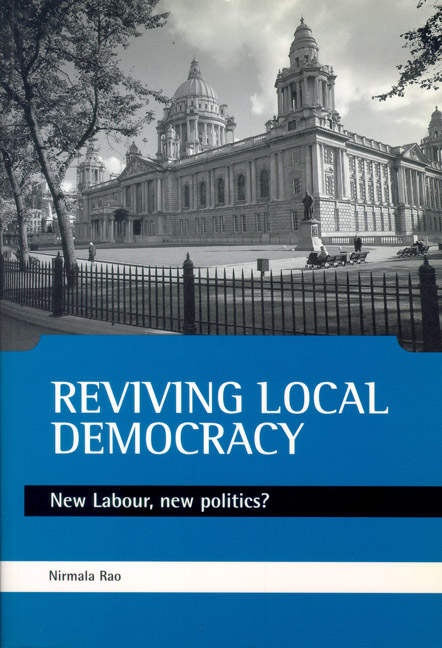Book contents
- Frontmatter
- Contents
- List of tables
- Acknowledgements
- one New times for local democracy
- two Local democracy and after
- three The failed promise of reform
- four Civic-minded Britain?
- five The reluctant voter
- six The third way and democratic reform
- seven The modernising agenda: enhancing participation
- eight The modernising agenda: new forms of political leadership
- nine Prospects for a new politics
- Bibliography
- Appendix A The surveys
- Appendix B The legislation
- Index
two - Local democracy and after
Published online by Cambridge University Press: 05 July 2022
- Frontmatter
- Contents
- List of tables
- Acknowledgements
- one New times for local democracy
- two Local democracy and after
- three The failed promise of reform
- four Civic-minded Britain?
- five The reluctant voter
- six The third way and democratic reform
- seven The modernising agenda: enhancing participation
- eight The modernising agenda: new forms of political leadership
- nine Prospects for a new politics
- Bibliography
- Appendix A The surveys
- Appendix B The legislation
- Index
Summary
Britain's system of local government is rightly said to be a 19th-century creation. As such, its origins are inseparable from the rise of popular politics, with all the passions that they inspired. ‘The representation of the people’ – a stirring phrase still used today for statutes dealing with electoral matters – was to be achieved at both the parliamentary and the local level. Local councils were seen as the mechanism by which ordinary people could participate in the politics and governance of their own local communities. As such, they were to provide a training ground for participation in the wider world of political life. Although the new county, district and parish councils fell short of expectations – few working men were elected, and the new authorities tended to be dominated by the old order – they nevertheless succeeded in providing a platform for popular participation. In the towns, on the other hand, political contests could be fierce.
As the 20th century progressed, it proved difficult to sustain popular interest and participation in local politics. Although around half the electors voted in most contested elections, many rural areas often produced no contest, with prominent people – sitting councillors in particular – being returned unopposed. The system settled into stasis, with long service the norm and some well-established councillors serving for virtually the whole of their adult lives. Politics in the towns also gradually settled. During the 1920s and 1930s, many Conservative voters moved out to the growing suburbs, while the rise of Labour secured the industrial cities as fiefdoms for that party. Local politics came to be a closed shop, with social leaders and their networks on the one hand, and suspicious party officials on the other, controlling entry to the representative process. The great hopes of the 19th-century reformers were as dust.
But if local politics was withering, local government was thriving – especially after 1945. Local authorities were the natural vehicles for delivering the greatly expanded services of the welfare state. Some local services – particularly those concerned with the urban infrastructure – were lost to national or regional bodies, but many more were developed under new legislation, and these new services tended to be people-oriented or ‘human’ services.
- Type
- Chapter
- Information
- Reviving Local DemocracyNew Labour, New Politics?, pp. 7 - 28Publisher: Bristol University PressPrint publication year: 2000



